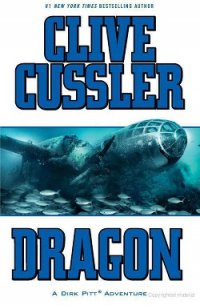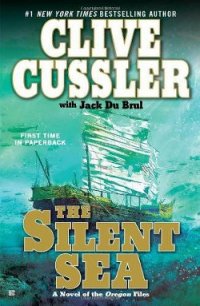White Death - Cussler Clive (читать полностью книгу без регистрации .txt) 📗
"But if they want to poison themselves and their kids," the re- porter said, "isn't it intolerant of SOS to condemn their traditions?"
"Gladiatorial combat and public executions were traditions once. Civilization decided these savage spectacles have no place in the mod- ern world. Inflicting unnecessary pain on defenseless animals is the same thing. They say it's tradition. We say it's murder. That's why we're back."
"Why not continue with the boycott?" the BBC man asked. Therri addressed the question. "The boycott was too slow. Hun- dreds of pilot whales continue to be killed. So we've changed our strategy. The oil industry wants to sink wells in these waters. If we bring enough bad publicity to the hunt, the oil companies might hold back. That would put pressure on the islanders to end their grinds."
"And we've got other business here as well," Ryan added. "There's a multinational fish-processing company that we're going to picket to demonstrate our opposition to the harmful effects offish-farming."
The Fox News reporter was incredulous. "Is there anyone you don't plan to antagonize?"
"Let me know who we've missed," Ryan said to laughter.
The BBC man said, "How far do you intend to push your protest?"
"As far as we can. This hunt is illegal under international law, in our opinion. You people are here as witnesses. Things could get dicey. If anyone wants to leave now, I can arrange a transfer." He scanned the faces surrounding him and smiled. "No one? Good. Well, then, brave souls, into the breach we go. We've been keeping track of several pods of pilot whales. The waters around here fairly teem with them. That young deckhand you see waving wildly may have something to tell us."
A crew member who had been keeping watch trotted over. "A couple of pods are passing by Stremoy/' he said. "Our observer on shore says the siren's wailing and the boats are being launched."
Ryan turned back to the reporters. "They'll probably try to drive the whales ashore at the Kvivik killing field. We'll put ourselves be- tween the boats and the whales. If we can't drive the pod away, we'll start cutting the boats off."
The CNN reporter pointed to the cruiser. "Isn't it going to irritate those chaps?"
"I'm counting on it," Ryan said, with a ferocious grin.
High in the bridge of the LeifErifsson, a man in civilian clothes squinted at the Sea Sentinel through a powerful pair of binoculars. "My God," Karl Becker murmured to Eric Petersen, the ship's cap- tain, "that ship looks as if it were painted by a madman."
"Ah, so you know Captain Ryan," Petersen replied, with a faint smile.
"Only by reputation. He seems to have what the Americans call a Teflon shield. For all his law-breaking, he has never been convicted on any charge. What do you know of Ryan, Captain?"
"First of all, he is not mad. He is possessed with a near-fanatical determination, but all his actions are measured. Even the gaudy color scheme of his ship is calculated. It lulls unsuspecting opponents into making mistakes-and shows up quite well on television."
"Maybe we could arrest them for visual pollution of the sea, Cap- tain Petersen," said Becker.
"I suspect Ryan would find an expert to say the ship is nothing less than a floating work of art."
"Glad to see that you've maintained your sense of humor despite the humiliation this ship suffered from its last encounter with the Sentinels of the Sea."
"It only took a few minutes of hosing down the deck to get rid of the garbage they threw at us. My predecessor felt that it was neces- sary to respond to the garbage attack with gunfire."
Becker winced. "Captain Olafsen was still commanding a desk the last time I heard. The publicity was incredibly bad. 'Danish War- ship Attacks Unarmed Boat.' Headlines that the crew was drunk. My God, what a disaster!"
"Having served as Olafsen's first officer, I have the greatest re- spect for his judgment. His problem was that he didn't have clear di- rection from the bureaucrats in Copenhagen."
"Bureaucrats like me?" Becker said.
The captain responded with a tight smile. "I follow orders. My su- periors said that you were coming aboard as a navy-department ob- server. Here you are."
"I wouldn't want a bureaucrat aboard my ship if I were in your shoes. But I assure you, I have no authority to supersede your orders. I will, of course, report what I see and hear, but let me remind you that if this mission is a fiasco, both our heads will roll."
The captain hadn't known what to make of Becker when he first welcomed him aboard the Erilsson. The official was short and dark, and with his large, moist eyes and long nose, he looked like a de- spondent cormorant. Petersen, on the other hand, fit the common mold for many Danish men. He was tall, square-jawed and blond.
"I was reluctant to have you aboard," the captain said, "but the hot- heads who are involved in this situation could let things get out of control. I welcome the opportunity to consult with someone from the government."
Becker thanked the captain and said, "What do you think of this grindarap business ? "
The captain shrugged. "I have many friends on the island. They would rather die than give up their old customs. They say it's what makes them who they are. I respect their feelings. And you?"
"I'm a Copenhagener. This whale thing seems like a big waste of time to me. But there's a great deal at stake here. The government respects the wishes of the islanders, but the boycott has hurt their fish- ing. We don't want the Faroes to lose their livelihood so that they be- come a ward of the state. Too damned expensive. To say nothing of the revenue losses to our country if the oil companies are persuaded to hold back their drilling because of this whale hunt."
"I'm well aware that this situation is something of a morality play. All the actors know their roles exactly. The islanders have planned this grind to defy SOS and to make sure Parliament is aware of their concerns. Ryan has been just as vocal in saying he won't allow any- thing to stand in his way."
"And you. Captain Petersen, do you know your role?" "Of course. I just don't know how the drama ends." Becker grunted in answer.
"Let me reassure you," the captain said, "the Faroe Police have been ordered to stay in the background. Under no circumstances am I to use guns. My orders are to protect the islanders from danger. I can use my judgment on how this is to be done. If the Sea Sentinel comes close enough to endanger the smaller boats, then I have the au- thority to nudge the SOS ship aside. Please excuse me, Mr. Becker. I see that the curtain is about to go up."
From several harbors, fishing boats were racing to a disturbed area of ocean. They were moving fast, their bows up on plane, bounc- ing over the low chop. The boats were converging on a spot where the shiny black backs of a pod of pilot whales broke the surface. Fountains of spray exploded from the whales' blowholes.
The Sea Sentinel was also moving in on the whales. Petersen gave his helmsman orders. The cruiser broke out of its holding pattern.
Becker had been mulling over Petersen's earlier words.
"Tell me, Captain, when does a 'nudge' become a ram?"
"Whenever I want it to."
"Isn't there a fine line between the two?"
Petersen told his helmsman to increase speed and set a course di- rectly toward the Sea Sentinel. Then the captain turned to Becker and gave him a grim smile.




